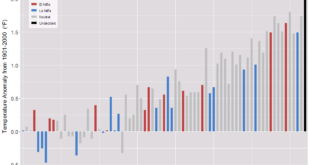The crack in the  Larsen C ice shelf has been in the news recently. For instance Newsweek’s Another Huge Crack has Appeared on the Antarctica’s Larsen C Ice Shelf or the BBC’s The Crack that is Redrawing the World’s Map. Both articles seem to stem from the Project Midas news release A new branch of the rift on Larsen C (they made the map here). The Newsweek article notes:
Larsen C ice shelf has been in the news recently. For instance Newsweek’s Another Huge Crack has Appeared on the Antarctica’s Larsen C Ice Shelf or the BBC’s The Crack that is Redrawing the World’s Map. Both articles seem to stem from the Project Midas news release A new branch of the rift on Larsen C (they made the map here). The Newsweek article notes:
Current projections indicate that if the Larsen C ice shelf disintegrates, it could raise sea levels by up to 10cm.
A NASA report, Breaking the ice: Antarctic rifts and future sea level is a little more precise:
Yet even if the whole ice shelf were to break up, Fricker said, the resulting sea level rise would be minimal. The glaciers held back by the shelf are not so imposing.
“The Larsen C ice shelf only holds back about one centimeter of global sea level rise,” she said.
Still, the crack in Larsen C could be a bellwether for ice shelves elsewhere on the continent, Rignot said.
“What we are seeing on Larsen C has implications for the big ice shelves farther south that hold considerable (sea level) potential,” he said. The loss of these larger ice shelves and the resulting acceleration of glacial calving could amount to meters of sea level rise in the decades and centuries to come.
The NASA article does provide some balance:
Ice shelf demise, or business as usual?
The crack could be the start of a period of sustained retreat, similar to what happened to Larsen B, said Ala Khazendar, a JPL scientist who has investigated both Larsen B and Larsen C. An increasingly weakened ice shelf allows glaciers to speed their flow into the ocean, and the shelf, unable to recover its former bulk and solidity, disintegrates.
Or, this could turn out to be a normal calving episode.
“We have no way yet of knowing whether Larsen C is doing what Larsen C has been doing for thousands of years, or whether we are witnessing the beginning of the end of Larsen C,” he said.
If you are talking about climate change in the classroom, the NASA article is excellent for further readings and discussion as well as the Project Midas site. There is some interesting science here in understanding ice.
